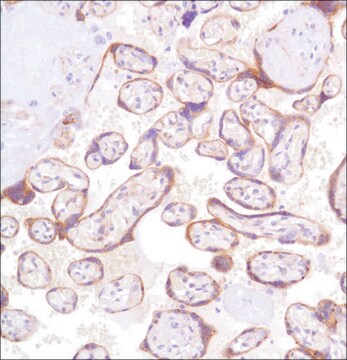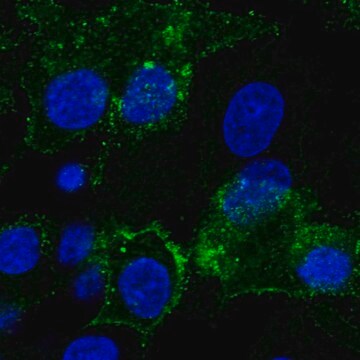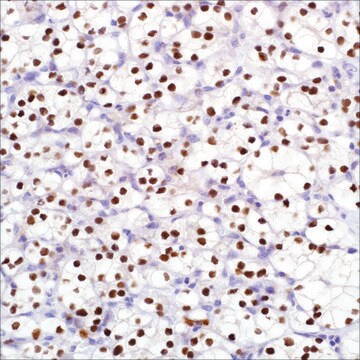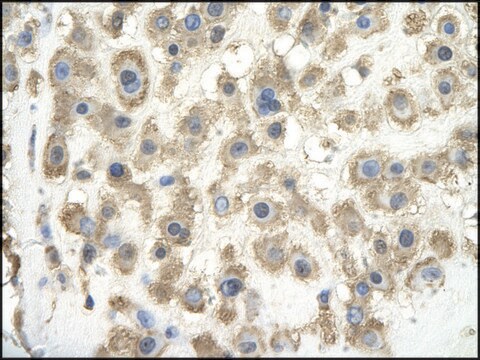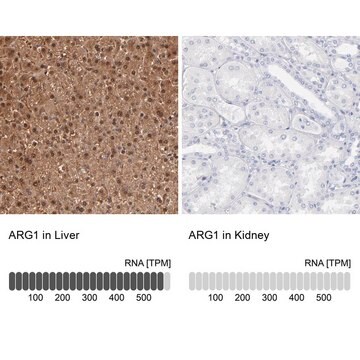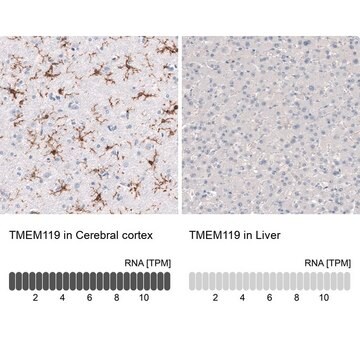추천 제품
생물학적 소스
mouse
Quality Level
100
500
결합
unconjugated
항체 형태
culture supernatant
항체 생산 유형
primary antibodies
클론
1G12, monoclonal
설명
For In Vitro Diagnostic Use in Select Regions (See Chart)
양식
buffered aqueous solution
종 반응성
human
포장
vial of 0.1 mL concentrate (261M-94)
vial of 0.5 mL concentrate (261M-95)
bottle of 1.0 mL predilute (261M-97)
vial of 1.0 mL concentrate (261M-96)
bottle of 7.0 mL predilute (261M-98)
제조업체/상표
Cell Marque®
기술
immunohistochemistry (formalin-fixed, paraffin-embedded sections): 1:100-1:500
동형
IgG1
제어
hepatocellular carcinoma (HCC)
배송 상태
wet ice
저장 온도
2-8°C
시각화
cytoplasmic
유전자 정보
human ... GPC3(2719)
일반 설명
Glypican-3 (GPC3) is a membrane-bound heparin sulfate proteoglycan known to participate in cell growth and differentiation. GPC3 expression has been observed in the majority of hepatocellular carcinomas (HCC), but is rarely expressed in non-neoplastic hepatic tissue, making it a useful marker for HCC. Aditionally, this marker is expressed in many yolk sac tumors.
품질
 IVD |  IVD |  IVD |  RUO |
결합
Glypican-3 Positive Control Slides, Product No. 261S, are available for immunohistochemistry (formalin-fixed, paraffin-embedded sections).
물리적 형태
Solution in Tris Buffer, pH 7.3-7.7, with 1% BSA and <0.1% Sodium Azide
제조 메모
Download the IFU specific to your product lot and formatNote: This requires a keycode which can be found on your packaging or product label.
기타 정보
For Technical Service please contact: 800-665-7284 or email: service@cellmarque.com
법적 정보
Cell Marque is a registered trademark of Merck KGaA, Darmstadt, Germany
적합한 제품을 찾을 수 없으신가요?
당사의 제품 선택기 도구.을(를) 시도해 보세요.
가장 최신 버전 중 하나를 선택하세요:
시험 성적서(COA)
Lot/Batch Number
Dina Kandil et al.
Cancer, 111(5), 316-322 (2007-09-01)
Glypican-3 (GPC3) is a heparan sulfate proteoglycan which is elevated in the serum of patients with hepatocellular carcinoma (HCC), but not in healthy blood donors, or patients with benign liver disease. GPC3 immunohistochemistry (IHC) is a promising marker of HCC
Wanda M P Coston et al.
The American journal of surgical pathology, 32(3), 433-444 (2008-02-28)
Distinguishing a well-differentiated hepatocellular carcinoma (HCC) from normal and cirrhotic liver tissue or benign liver nodules, such as hepatic adenoma (HA) and focal nodular hyperplasia (FNH), may be very difficult in some cases, particularly in small needle core biopsies. We
Dina H Kandil et al.
Advances in anatomic pathology, 16(2), 125-129 (2009-06-25)
Glypican-3 (GPC3) is a heparan sulfate proteoglycan that plays an important role in cell growth and differentiation. GPC3 function is tissue dependent. In some tissues, GPC3 acts as a tumor suppressor gene, whereas in others, it acts as an oncofetal
Debra L Zynger et al.
The American journal of surgical pathology, 30(12), 1570-1575 (2006-11-24)
Glypican 3 (GPC3), a membrane-bound heparin sulfate proteoglycan, may play a role in promoting embryonic cell growth and differentiation. GPC3 is mutated in Simpson-Golabi-Behmel syndrome, characterized by tissue overgrowth and an increased risk of embryonal malignancies. Recently, GPC3 was reported
Mariana Capurro et al.
Gastroenterology, 125(1), 89-97 (2003-07-10)
Early detection of hepatocellular carcinoma (HCC) is critical for successful treatment. However, the differential diagnosis between HCC and benign hepatic lesions is sometimes difficult and new biochemical markers for HCC are required. It has been reported that glypican-3 (GPC3) messenger
자사의 과학자팀은 생명 과학, 재료 과학, 화학 합성, 크로마토그래피, 분석 및 기타 많은 영역을 포함한 모든 과학 분야에 경험이 있습니다..
고객지원팀으로 연락바랍니다.